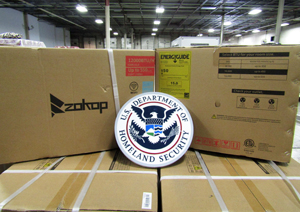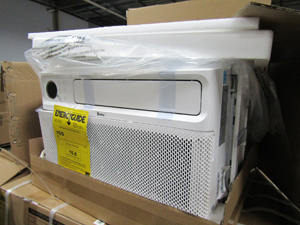NORFOLK, Va. – A shipment of air conditioners from China got a chilly reception in Norfolk, Va., after U.S. Customs and Border Protection seized them on Thursday for bearing counterfeit Energy Star certification marks. The air conditioners were valued at $95,000.
CBP officers initially examined the shipment of 305 window air conditioners destined for Arcadia, California on May 21. The air conditioners’ product packaging included the logo of Energy Star, a certification mark owned by the U.S. Environmental Protection Agency (EPA) that is only authorized to be applied to products that have been certified to meet strict energy-efficiency specifications set by the EPA.
Officers were unable to locate the models among the online listing of all energy efficient products certified by the EPA, located at, and detained the shipment for further review. CBP officers submitted product documentation and photographs to CBP’s trade experts at the Consumer Products and Mass Merchandising Center of Excellence and Expertise (CEE) for analysis.
On June 21, after consulting with the EPA, CBP’s trade experts verified that the air conditioners were unauthorized to bear the Energy Star name and design marks and that the marks were therefore counterfeit. Merchandise bearing counterfeit marks is subject to seizure and forfeiture pursuant to CBP’s statutory and regulatory authorities.
The Energy Star trademark is a trusted symbol indicating energy efficiency. Falsely implying that a product has been certified as energy efficient by the EPA could lead to unexpected increases in energy costs for consumers. Additionally, manufacturers who are willing to use fraudulent trademarks are also likely to cut corners on other product quality standards, which could lead to consumer safety threats such as refrigerant leaks, electrical hazards, or fire.
CBP officers seized the counterfeit air conditioners on Thursday.
“Unscrupulous manufacturers and vendors illegally profit on the sale of substandard counterfeit products at the expense and safety of American consumers,” said Mark Laria, CBP’s Area Port Director for the Area Port of Norfolk-Newport News, Va. “Customs and Border Protection urges consumers to protect their health and wallets by buying authentic consumer goods from reputable or authorized vendors.”
The international trade in counterfeit consumer goods is illegal. It steals revenues from trademark holders, steals tax revenues from the government, funds transnational criminal organizations, and the unregulated products potentially threaten the health and safety of American consumers. Counterfeit consumer goods may also be sourced or manufactured in facilities that employ forced labor.
CBP protects businesses and consumers every day through an aggressive Intellectual Property Rights (IPR) enforcement program. During fiscal year 2022, CBP officers and Homeland Security Investigations (HSI) special agents seized nearly 21,000 shipments containing goods that violated IPR, which equates to nearly 25 million counterfeit goods. The total estimated MSRP of the seized goods, had they been genuine, was over $2.98 billion (USD), or an average of over $8 million every day.
Media can search for additional enforcement details by viewing CBP’s IPR webpage or by viewing previous years’ annual counterfeit goods seizure reports.
U.S. trademark and copyright owners can register with CBP to have their intellectual property protected at the border through the through the e-Recordation program (https://iprr.cbp.gov/s/).
To report suspected counterfeits, visit CBP’s online e-Allegations portal or call 1-800-BE-ALERT. More information about counterfeit goods is available on CBP’s Truth Behind Counterfeits website and StopFakes.gov.
CBP's border security mission is led at our nation’s Ports of Entry by CBP officers and agriculture specialists from the Office of Field Operations. CBP screens international travelers and cargo and searches for illicit narcotics, unreported currency, weapons, counterfeit consumer goods, prohibited agriculture, invasive weeds and pests, and other illicit products that could potentially harm the American public, U.S. businesses, and our nation’s safety and economic vitality.
See what CBP accomplished during "A Typical Day" in 2022. Learn more at www.CBP.gov.
Follow the Director of CBP’s Baltimore Field Office on Twitter at @DFOBaltimore for breaking news, current events, human interest stories and photos, and CBP’s Office of Field Operations on Instagram at @cbpfieldops.



